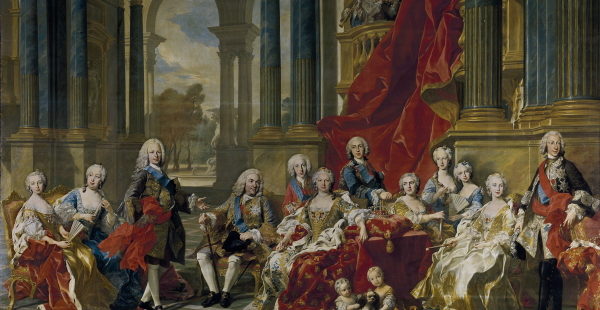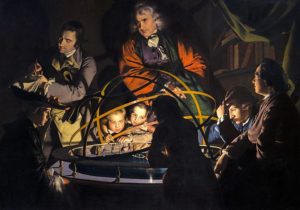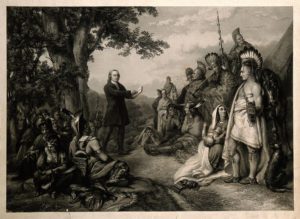
The Eighteenth Century: The Tides of History
This post is the beginning of a series on the eighteenth century. To learn more about this fascinating era, check out The Eighteenth Century: The Great Events, as well as my summaries of the eighteenth century in Great Britain and in America.
“I never go into the country for a change of air and a holiday. I always go instead into the eighteenth century.” So said Anatole France, and I concur – this century fascinates me, filled as it is with adventure, grand ideas, famous (and infamous) people, and God’s Spirit at work in the world.
Because I’m so interested in this topic, I’m launching a short series on the eighteenth century. Because this is such a broad subject, I’ll focus on Europe and America, and especially Britain, France, and America. This week I’m discussing the major ‘tides’ that influenced the eighteenth century; next week I’ll delve into the major events; from there, I’ll focus on Great Britain and other sections of the world.
The eighteenth century technically covers the years 1701-1800. Historians also recognize a ‘long’ eighteenth century (c. 1688-1815) bounded by the Glorious Revolution and the Battle of Waterloo. The ‘short’ eighteenth century (1715-1789) starts with the death of Louis XIV of France and ends with the French Revolution. These posts will focus on the ‘long’ eighteenth century.
Every age has its great movements. These are the ‘tides that advance unstoppably, rarely obvious at the time, but clear from a distance.
Age of Enlightenment
The Enlightenment was a philosophical and intellectual movement that focused on the ability of human reason to achieve knowledge. Enlightenment philosophers were notoriously skeptical; Rene Descartes created his philosophy by doubting everything that he could doubt, until he attained the first certainty that was beyond doubt: that he was doubting. From here he postulated his famous axiom: “I think, therefore I am.” While Descartes was able to successfully transition from this tenant to a belief in the Christian God, many other philosophers were not. Yet while many enlightenment thinkers doubted established religion and divine revelation, they often held to ‘deism’ – the idea that a great impersonal God had ‘wound the clock’ of the world and let it run. Hence, the world was envisioned as a vast machine, ordered by laws and principles which could be discovered by careful application of the scientific method and the laws of logic.
Christianity and Enlightenment philosophy were locked in combat during the 18th century on the question of the supernatural: Christians affirmed that the Bible is a divine revelation which records God’s unique interventions in history, while Deists countered that there is no such thing as divine intervention, except perhaps in the creation of the world. Despite this significant difference, Christians and Deists could find common ground in the idea of the world as an orderly place governed by scientific laws which awaited human discovery.
Age of Science
If the Enlightenment changed the politics of its day, it also shaped the scientific world. Since the time of the Renaissance, humanism was on the rise – the idea that man can be master of his environment. Christians and Deists joyfully pursued every branch of knowledge, eager to discover the fundamental laws that gave order to the natural world. Such knowledge was then used in an effort to harness it for the benefit of humans. Famous inventors and discoverers such as Benjamin Franklin, Michael Faraday, and James Watt were active during this period, performing scientific experiments and busily cataloging and categorizing the natural world.
As a result of these discoveries, science made tremendous advances. Medicine remained mostly undeveloped, but the smallpox vaccine, discovered by Edward Jenner, began the process of that disease’s eradication (during the eighteenth century it was one of the most common, feared, fatal, and disfiguring of diseases).
The steam engine was invented in 1689 and improved over the following century. This marvel, along with other machines, allowed an industrial revolution to develop. Britain is most associated with the industrial revolution, and this gave Britain a vast amount of products to trade, increasing her economic and political power. It also merged well with Britain’s colonial empire, which provided raw materials and markets for trade.
The process of industrialization moved families from the countryside to the cities and urbanized society, bringing to its end the traditional agricultural system in which political power was held by control of the countryside. These changes were in place during the eighteenth century, but they were by no means completed by its end. Further, the industrial revolution led to a larger middle class and general improvements in life, as previously expensive products were mass-produced.
If the natural sciences could benefit from the scientific method, perhaps the social sciences could as well. In an effort to better understand economics, Adam Smith studied and made observations until publishing his famous book The Wealth of Nations. Smith wanted to understand how nations become wealthy, and his observations demonstrated that personal self-interest naturally resulted in wealth. Free trade, rather than government intervention, worked to promote prosperity. This was contrary to the common theory of the time, mercantilism, which argued that wealth does not increase. Rather, mercantilism tried to protect the wealth of every kingdom by hoarding the treasure, increasing exports, and limiting imports.
Age of Sail
 At the same time that science increased knowledge, so did exploration. Europeans were fascinated by the broader world around them, especially since large sections of the map remained terra incognita. With massive ships and powerful guns, Europeans had the edge of military technology that allowed them to travel in relative safety across all the world’s oceans. Virtually all of Africa, as well as the interiors of America, were unexplored. Australia had only been discovered by Europeans in 1606, and James Cook did significant exploration in the South Seas. He may have been the first European to see the Sandwich Islands (Hawaii) in 1778. Cook also crossed the Antarctic Circle, though that continent remained unobserved until 1819 or 1820.
At the same time that science increased knowledge, so did exploration. Europeans were fascinated by the broader world around them, especially since large sections of the map remained terra incognita. With massive ships and powerful guns, Europeans had the edge of military technology that allowed them to travel in relative safety across all the world’s oceans. Virtually all of Africa, as well as the interiors of America, were unexplored. Australia had only been discovered by Europeans in 1606, and James Cook did significant exploration in the South Seas. He may have been the first European to see the Sandwich Islands (Hawaii) in 1778. Cook also crossed the Antarctic Circle, though that continent remained unobserved until 1819 or 1820.
With the ability to traverse the globe, the technology to win wars, and the knowledge of the enlightenment, Europeans were in a prime position to create empires. In the most positive light, the colonies were hoped to be kindly, beneficial extensions of civilization that brought order to a chaotic world and brought the blessings of civilization to those who were without it. Hence, the European colonist could echo the sentiment of the Roman Juba,
“A Roman soul is bent on higher views:
To civilize the rude unpolish’d world,
And lay it under the restraint of laws;
To make Man mild, and sociable to Man;
To cultivate the wild licentious savage
With wisdom, discipline, and liberal arts;
Th’ embellishments of life: virtues like these
Make human nature shine, reform the soul,
And break our fierce barbarians into men.”
Yet such high and noble ideals were often ignored in the blind desires for power and wealth. Nowhere is this seen more clearly than in the Atlantic slave trade, where greedy merchants purchased millions of Africans from the shores of West Africa and sailed them – in squalid conditions – to slavery in the ports of the New World. The Portuguese, British, French, Spanish, and Dutch were all engaged in this evil commerce, transporting – in the eighteenth century alone – five million souls across the Atlantic. Another eight million failed to survive the trek from inland Africa to the colonies. Over 90 percent of these slaves did not end up in the future United States, but rather on the islands of the Caribbean or South America. Indeed, those places were so much more violent in their treatment of slaves that they had to be regularly resupplied to maintain sufficient populations; to end up as a slave in the American colonies, was almost ‘good luck’ compared to the extreme overwork and harshness of the Caribbean.
British, French, Spanish, and Dutch were all engaged in this evil commerce, transporting – in the eighteenth century alone – five million souls across the Atlantic. Another eight million failed to survive the trek from inland Africa to the colonies. Over 90 percent of these slaves did not end up in the future United States, but rather on the islands of the Caribbean or South America. Indeed, those places were so much more violent in their treatment of slaves that they had to be regularly resupplied to maintain sufficient populations; to end up as a slave in the American colonies, was almost ‘good luck’ compared to the extreme overwork and harshness of the Caribbean.
Age of Revolution
The organized religions of Europe taught believers to view the world as a orderly and arranged place where everything had a proper place. The highly organized music of the Baroque period, along with the detailed and relatively realistic paintings of the period, are wordless commentary on this view. At the far extreme, the idea of the divine right of kings led to absolutism: the view of the king as so thoroughly endowed by God with the task of rule that his commands were above critique. Louis XIV of France was most notorious in this regard, but it was a common theme through the great monarchies of Europe.
 The Enlightenment challenged this view also, but it did not overthrow the foundation. Enlightenment philosophers were generally Deists, and hence believed that there was an order to the world, but they denied that kings were necessarily superior to other men. On the contrary, they argued – along with many Christians – that the order of the world implied that all men have worth, and this became the impetus for a return to democratic societies and republics. This emphasis was furthered by the strong interest in antiquity – Europeans were studying the histories of Greece and Rome and seeking to develop political philosophies from their observations.
The Enlightenment challenged this view also, but it did not overthrow the foundation. Enlightenment philosophers were generally Deists, and hence believed that there was an order to the world, but they denied that kings were necessarily superior to other men. On the contrary, they argued – along with many Christians – that the order of the world implied that all men have worth, and this became the impetus for a return to democratic societies and republics. This emphasis was furthered by the strong interest in antiquity – Europeans were studying the histories of Greece and Rome and seeking to develop political philosophies from their observations.
The revolutionary ideas of federalism and republicanism aimed to preserve a strong sense of order in society, but to regulate human life by scientific principles of government and the value of the common man. While kings and emperors were hesitant to embrace such ideas, the cruelty and disregard for human life that often occurred (such as the use of the dread ‘breaking wheel’ for torture) only hastened such ideas.
Unsurprisingly, such combustible ideas soon exploded on the world scene in a series of momentous revolutions. The American Revolution aimed to create a federalist, republican government with a democratic bent. This meant that educated citizens were given charge of the government, and they were to elect statesmen whom they recognized as capable of guiding an enlightened nation. The French Revolution – so bloody that it made the American Revolution look like a church service – was guided by “The Declaration of the Rights of Man and of the Citizen.” When finished, both revolutions had succeeded in declaring freedom from their respective monarchies; the French had also managed to ruin a striking number of ancient monuments and churches. Britain followed a more moderate course of reforms, but could not prevent the change in public sentiment toward a more representative government.
Age of Awakening
If the eighteenth century is known for its philosophic enlightenment, it was also an age of remarkable spiritual enlightenment. There are times when the Spirit of God moves in profound ways in the world, and the eighteenth century observed that.
The century began with newfound religious freedoms, but Puritanism – which had endured persecution so stoutly – practically disappeared. In its place was moral corruption. The seventeenth century was notorious for its dead orthodoxy and religious wars. As a result, religion was viewed as a set of philosophic tenants without life or power. Too strong of an attachment to such views was a dangerous thing, something that could lead to radicalism. The Thirty-Years War (the most traumatic European War until World War One) was still on the minds of many, and it had been a bloodbath of eight million souls over Catholic and Protestant power struggles.
With dead orthodoxy and deism as the primary options, moral corruption was everywhere. One jokester in England quipped that the Parliament was going to remove the ‘not’ from the Ten Commandments and add it to the Apostle’s Creed, in order to bring those documents in line with the spirit of the times. Nor was this corruption limited to Europe; in America, the colonies that had been founded by fervent Puritans and religious asylum-seekers had soon degenerated to a similar level of dead orthodoxy.
In the face of such decay, the Great Awakening suddenly burst on the scene, heralded especially by George Whitefield and John Wesley. These men – Anglicans by denomination – preferred to preach in the open air. Tens of millions heard their message, and the movement known as ‘evangelicalism’ sprang from their preaching. They had been preceded by the Moravians, a fiercely spiritual group that was notable for its fervent prayer life and daring missionary expeditions. Moravian missionaries travelled to all parts of the world – including the slave plantations of the West Indies and the indigenous settlements of Greenland – to share the message of the Gospel. Their work was carried on by William Carey, the “Father of Modern Missions,” who opened the door to an even great missionary movement.
Summary
The world was emerging from the past. The great monarchies of Europe must face changing times, but they would not submit readily. It was an era of great evils requiring great reformation. It was a time of tyranny and absolutism. But it was also a time of radical ideas, great movements, and the influence of God’s Spirit. The world was reshaped in the eighteenth century, and we are still guided by its efforts and labors. It was also an age of great men: intellectual giants who would leave a lasting mark on civilization. Pondering these men, one is reminded of J. G. Machen’s question: “…the condition of modern mankind is such that one may well ask what it is that made the men of past generations so great and the men of the present generation so small.”
This post is the beginning of a series on the eighteenth century. To learn more about this fascinating era, check out The Eighteenth Century: The Great Events, as well as my summaries of the eighteenth century in Great Britain and in America.



